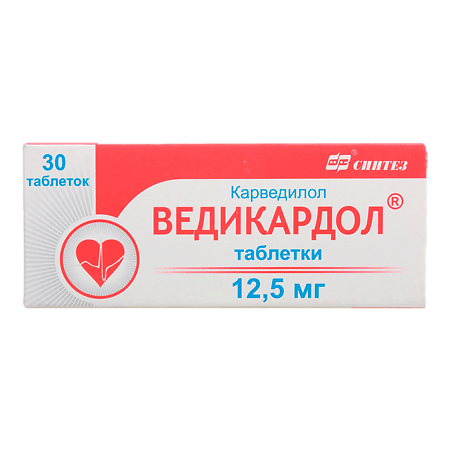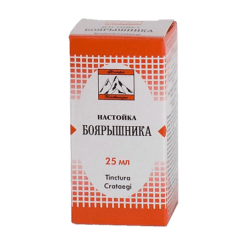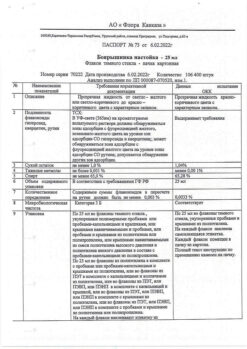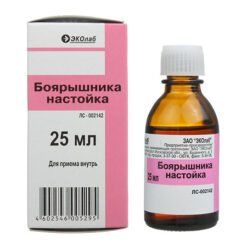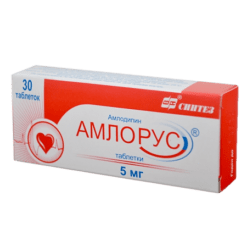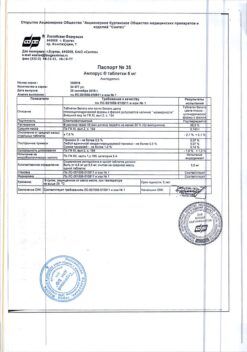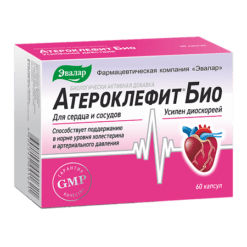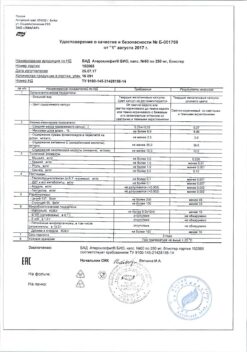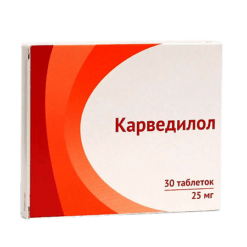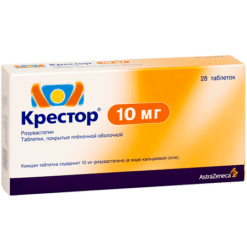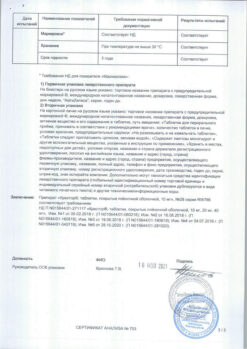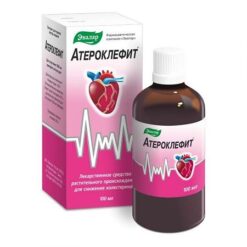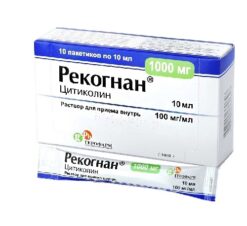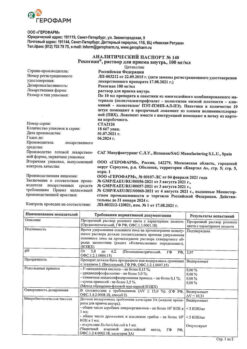No products in the cart.
Vedicardol, tablets 12.5mg 30 pcs
€1.00
Out of stock
(E-mail when Stock is available)
Description
Alpha- and beta-adrenoblocker. Carvedilol has a combined non-selective effect caused by blockade of 1-, 2- and 1-adrenoreceptors. The drug has no sympathomimetic activity of its own and has membrane stabilizing properties. Due to blockade of the -adrenoreceptors of the heart, BP, cardiac output and HR decreases.
Carvedilol suppresses the renin-angiotensin-aldosterone system through blockade of -adrenoreceptors in the kidneys, causing a decrease in plasma renin activity. By blocking adrenoreceptors, the drug may cause dilation of peripheral blood vessels, thereby reducing RPS.
A combination of adrenoreceptor blockade and vasodilatation has the following effects: in arterial hypertension – decrease of BP; in CHD – antianginal action; in patients with left ventricular dysfunction and circulatory insufficiency it has favorable effect on hemodynamic parameters, increases left ventricular ejection fraction and helps to reduce its size.
Indications
Indications
– Arterial hypertension (as monotherapy and in combination with diuretics);
– Coronary heart disease: stable angina pectoris;
– chronic heart failure (as part of combination therapy).
Active ingredient
Active ingredient
Composition
Composition
Active ingredient:
carvedilol 12.5 mg.
Excipients:
microcrystalline cellulose – 66 mg,
calcium stearate – 1.5 mg,
crospovidone – 3 mg,
talc – 4.5 mg,
lactose monohydrate – up to 150 mg.
How to take, the dosage
How to take, the dosage
The drug is taken orally, regardless of meals.
Arterial hypertension:
The starting dose is 6.25-12.5 mg once daily for the first 2 days of treatment. Thereafter, 25 mg once daily. In case of insufficient antihypertensive effect after 2 weeks of therapy, the dose may be doubled. The maximum recommended daily dose of the drug is 50 mg once daily, which can be divided into two doses.
Ischemic heart disease:
The starting dose is 12.5 mg 2 times daily for the first 2 days of treatment. Thereafter, 25 mg 2 times/day. In case of insufficient antianginal effect after 2 weeks of therapy, the dose may be doubled. The maximum recommended daily dose of the drug is 100 mg/day divided into 2 doses.
Chronic heart failure
The dose is adjusted individually under close medical supervision. The recommended starting dose is 3.125 mg 2 times daily for 2 weeks. If well tolerated, the dose is increased at intervals of at least 2 weeks to 6.25 mg 2 times/day, then to 12.5 mg 2 times/day and further to 25 mg 2 times/day. The dose should be increased to the maximum that is well tolerated by the patient. In patients with a body weight less than 85 kg, the target dose is 50 mg/day; in patients with a body weight greater than 85 kg, the target dose is 75-100 mg/day.
Interaction
Interaction
Carvedilol may potentiate the effect of other simultaneously taken antihypertensive agents or drugs that have a hypotensive effect (nitrates).
In concomitant use of Carvedilol and diltiazem, cardiac conduction abnormalities and hemodynamic disorders may develop.
Concomitant use of carvedilol and digoxin increases the concentration of the latter and may increase the AV conduction time.
Carvedilol may potentiate the effects of insulin and oral hypoglycemic agents, and the symptoms of hypoglycemia (especially tachycardia) may mask, therefore in diabetic patients it is recommended to monitor blood sugar level regularly.
Microsomal oxidation inhibitors (cimetidine) enhance and inducers (phenobarbital, rifampicin) weaken the hypotensive effect of carvedilol.
Drugs that reduce catecholamines (reserpine, MAO inhibitors) increase the risk of arterial hypotension and marked bradycardia.
Concomitant use of cyclosporine increases the concentration of the latter (correction of the daily dose of cyclosporine is recommended).
The concomitant administration of clonidine may potentiate the antihypertensive and heart rhythm-relieving effects of carvedilol.
General anesthetics enhance the negative inotropic and hypotensive effects of carvedilol.
Special Instructions
Special Instructions
The therapy should be prolonged and not stopped abruptly, especially in patients with CHD, as it may lead to a worsening of the course of the underlying disease. If necessary, reduction of the drug dose should be gradual, over a period of 1-2 weeks.
At the start of therapy with Vedicardol or when the dose is increased, patients, especially elderly patients, may have excessive BP reductions, mainly on standing up. Correction of the drug dose is necessary. In patients with chronic heart failure when adjusting the dose the symptoms of heart failure and edema may increase. In this case, the dose of Vedicardol should not be increased; it is recommended to prescribe high doses of diuretics until the patient’s condition stabilizes.
Continuous ECG and BP monitoring is recommended while concomitant administration of Vedicardol and slow calcium channel blockers, phenylalkylamine derivatives (verapamil), benzodiazepine derivatives (diltiazem), and also with class I antiarrhythmic agents.
It is recommended to monitor renal function in patients with chronic renal insufficiency, arterial hypotension and chronic heart failure.
If surgery is performed using general anesthesia, the anesthesiologist should be advised of prior therapy with Vedicardol.
Vedicardol has no effect on blood glucose concentration and does not cause changes in glucose tolerance test in patients with insulin-independent diabetes mellitus.
Patients with pheochromocytoma should be prescribed alpha-adrenoblockers before therapy.
When prescribing to patients who use contact lenses, note that the drug may cause decreased tear production.
At the time of treatment, avoid the use of ethanol.
Impact on driving and operating machinery
It is not recommended to drive at the beginning of therapy and when increasing the dose of Vedicardol. Other activities requiring high concentration and quick psychomotor reactions should be refrained from.
Contraindications
Contraindications
– acute heart failure;
– chronic heart failure (decompensation stage);
p> – severe hepatic insufficiency;
– degree II-III AV blockade;
– significant bradycardia (less than 50 bpm.
– significant bradycardia (less than 50 beats/min);
– SSSD;
– arterial hypotension (systolic BP less than 85 mm Hg.);
– cardiogenic shock;
– chronic obstructive pulmonary disease;
– age under 18 years (efficacy and safety have not been established);
– hypersensitivity to the components of the drug.
With caution should be used in Prinzmetal angina, thyrotoxicosis, peripheral vascular occlusive disease, pheochromocytoma, psoriasis, renal failure, AV blockade of degree I, in major surgical interventions and general anesthesia, in diabetes, hypoglycemia, depression, myasthenia.
Side effects
Side effects
CNS and peripheral nervous system disorders: dizziness, headache (usually mild and at the beginning of treatment), loss of consciousness, myasthenia gravis (more often at the beginning of treatment), increased fatigue, depression, sleep disorders, paresthesias.
Cardiovascular system disorders: bradycardia, orthostatic hypotension, AV-blockade of II-III degree; rarely – peripheral circulatory disorders, progression of heart failure (during dose increase), edema of lower limbs, angina pectoris, significant decrease of BP, intermittent claudication.
Gastrointestinal disorders: dry mouth, nausea, diarrhea or constipation, vomiting, abdominal pain, loss of appetite, increased liver transaminase activity.
Hematopoietic system disorders: rare – thrombocytopenia, leukopenia.
Metabolism disorders: weight gain, disorder of carbohydrate metabolism.
Respiratory system: dyspnea and bronchospasm (in predisposed patients).
Visual system disorders: visual impairment, decreased lacrimation.
Muscular system disorders: myalgia, arthralgia, pain in the extremities.
Urinary system disorders: rarely – disorders of urination, impaired renal function.
Allergic reactions: skin manifestations, nasal congestion.
Dermatological reactions: exacerbation of psoriasis.
Others: flu-like syndrome, sneezing.
Overdose
Overdose
Symptoms: decreased BP (accompanied by dizziness or fainting), bradycardia. Dyspnea due to bronchospasm and vomiting may occur. In severe cases, cardiogenic shock, respiratory distress, confusion, conduction disorders are possible.
Treatment: monitoring and correction of vital signs should be carried out, if necessary – in ICU. Symptomatic therapy is carried out. It is advisable to administer intravenous m-cholinoblockers (atropine), adrenomimetics (epinephrine, norepinephrine).
Pregnancy use
Pregnancy use
Aquadequate and strictly controlled clinical studies on the safety of Vedicardol administration during pregnancy have not been conducted, so the drug may be administered during pregnancy only when the estimated benefit to the mother outweighs the potential risk to the fetus.
Breastfeeding is not recommended during treatment with Carvedilol.
Similarities
Similarities
Additional information
| Shelf life | 2 years |
|---|---|
| Conditions of storage | In a dry, light-protected place at a temperature not exceeding 25 °C |
| Manufacturer | Sintez OAO, Russia |
| Medication form | pills |
| Brand | Sintez OAO |
Related products
Buy Vedicardol, tablets 12.5mg 30 pcs with delivery to USA, UK, Europe and over 120 other countries.

